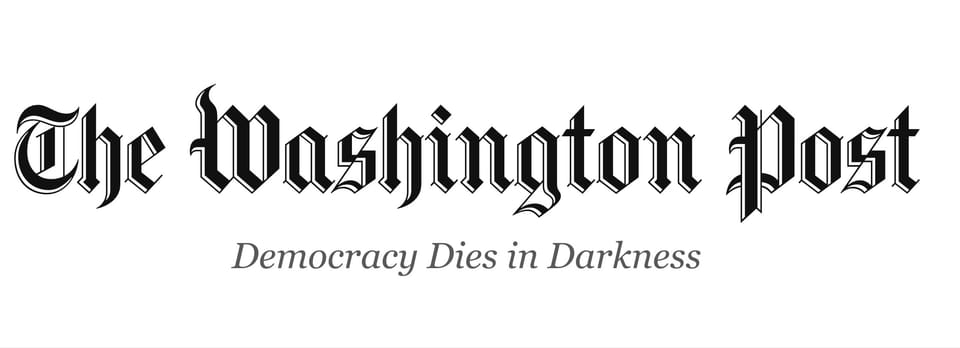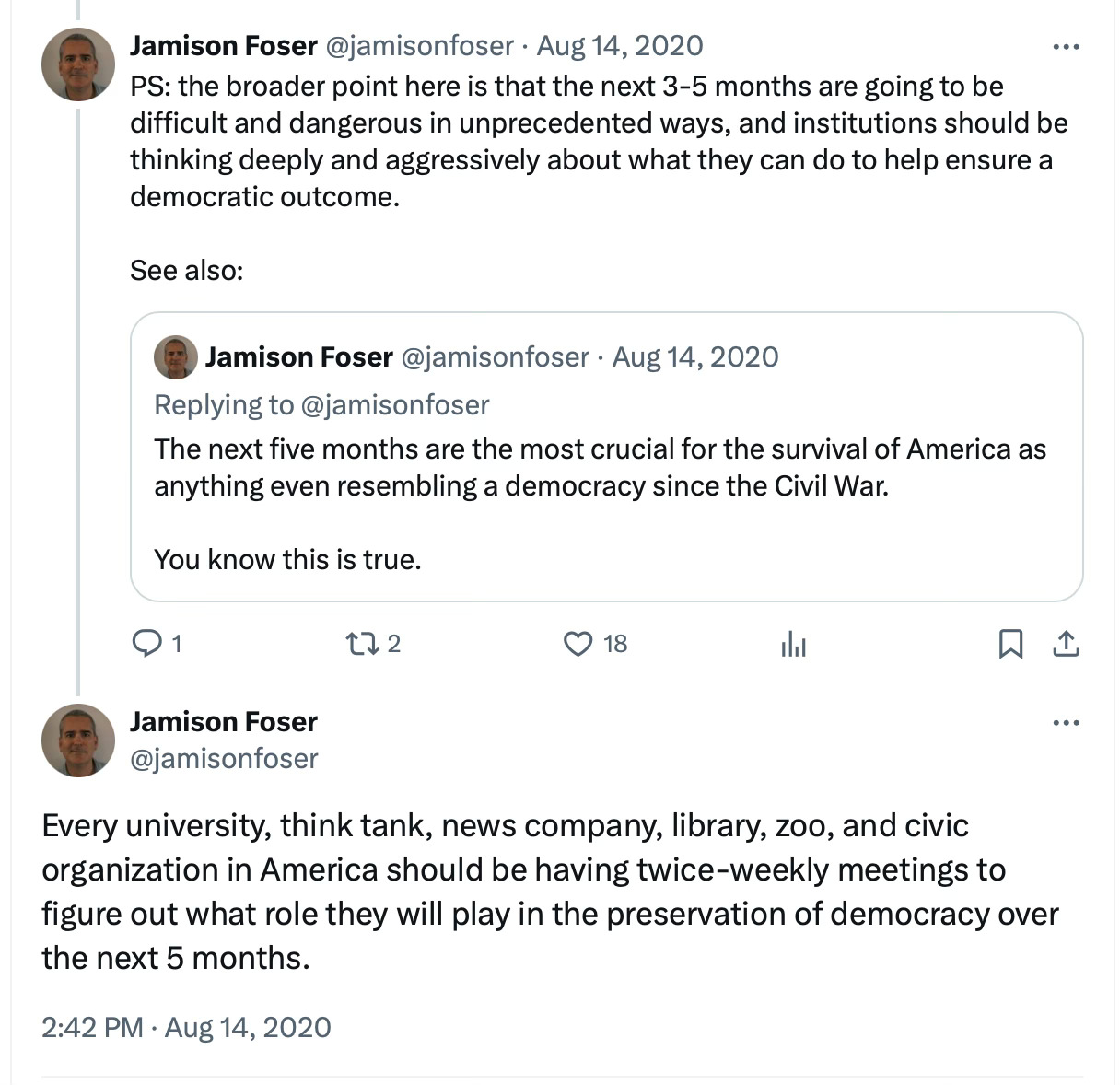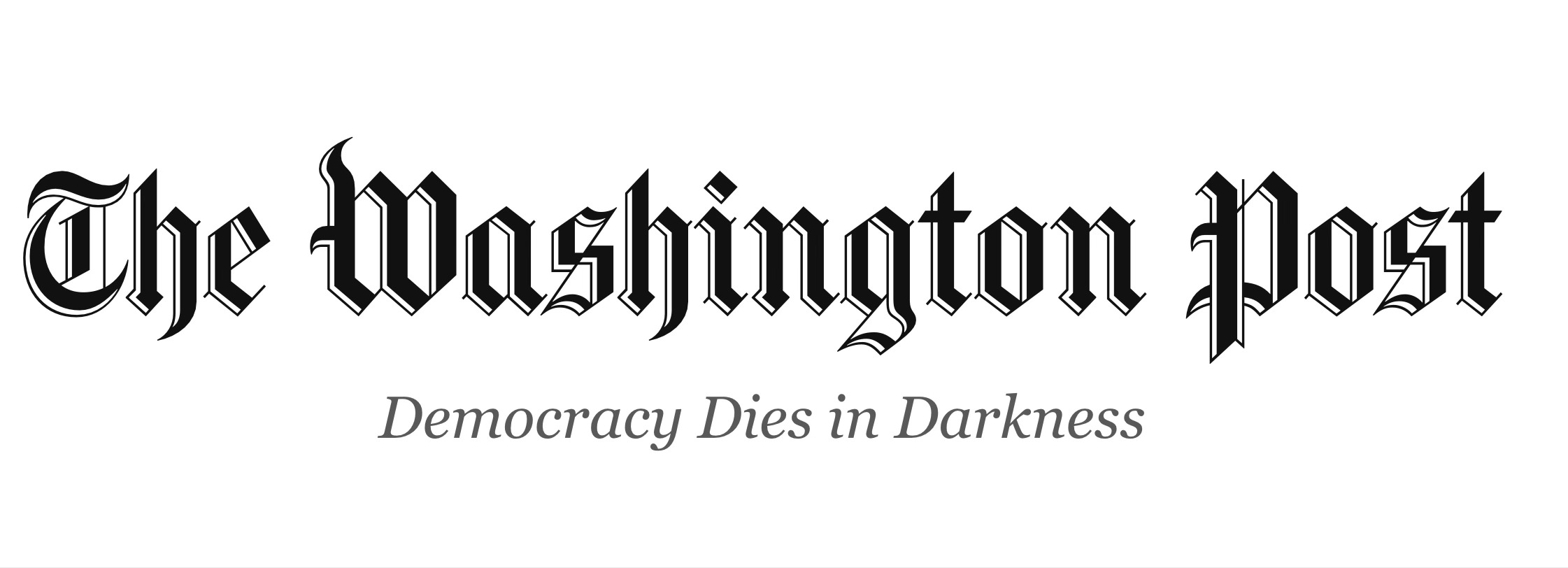The Washington Post Chooses Darkness

In August of 2020 I posted this on Twitter:

Even at the time I was pretty sure that ship had already sailed, though. At no point in the last decade has it seemed like our elite institutions — the failures of which helped Trump gain traction in the first place — were up to the challenge of stopping him, or even particularly interested in it. And, sure enough, pretty much none of our elites or institutions were ready for the insurrection Trump led a few months later, though America (barely) survived it.
I was reminded of that thread yesterday, when I read a New York Times op-ed by Harvard professors Steven Levitsky and Daniel Ziblatt, the authors of the book How Democracies Die. In their op-ed, Levitsky & Ziblatt describe “five strategies that pro-democratic forces around the world have employed” to “protect themselves from authoritarian threats from within” like that posed by Donald Trump and the Republican Party. Levitsky & Ziblatt note that four of the five have already failed (or been ruled out) in America and that only one remains viable:
That leaves a fifth strategy: societal mobilization. Democracy’s last bastion of defense is civil society. When the constitutional order is under threat, influential groups and societal leaders — chief executives, religious leaders, labor leaders and prominent retired public officials — must speak out, reminding citizens of the red lines that democratic societies must never cross. And when politicians cross those red lines, society’s most prominent voices must publicly and forcefully repudiate them.
[…]
The U.S. establishment is sleepwalking toward a crisis. An openly antidemocratic figure stands at least a 50-50 chance of winning the presidency. The Supreme Court and the Republican Party have abdicated their gatekeeping responsibilities, and too many of America's most influential political, business and religious leaders remain on the sidelines. Unable to rise above fear or narrow ambition, they hedge their bets. But time is running out.
What are they waiting for?
Today The Washington Post announced that it would not make an endorsement in the presidential race, breaking with both tradition and the moral imperatives of the moment.
In announcing the decision, Washington Post publisher William Lewis lied that the paper was “returning to our roots” of not making endorsements and lied that the decision was an act of “character and courage in service to the American ethic” and “a statement in support of our readers’ ability to make up their own minds.”
I describe these as “lies” for simple reasons: The Washington Post endorsed candidates as early as 1880, when it urged the defeat of endorsed James Garfield in the first presidential election that took place after the paper’s founding. So refusing to issue an endorsement is not a return to the Post’s roots. And the Post has endorsed candidates as recently as two weeks ago, when it endorsed a candidate in a Virginia congressional race. Therefore the Post’s decision not to endorse a candidate in the presidential race does not reflect some principled “support of our readers’ ability to make up their own minds.”
But most of all I say that Lewis is lying because The Washington Post itself has reported that in fact the paper’s editorial board had drafted an endorsement of Kamala Harris, but was prevented from publishing it by the paper’s owner, Amazon founder Jeff Bezos:
An endorsement of Harris had been drafted by Post editorial page staffers but had yet to be published, according to two sources who were briefed on the sequence of events and who spoke on the condition of anonymity because they were not authorized to speak publicly. The decision to no longer publish presidential endorsements was made by The Post’s owner, Amazon founder Jeff Bezos. “This was a Washington Post decision to not endorse, and I would refer you to the publisher’s statement in full,” said Chief Communications Officer Kathy Baird.
The Post’s decision not to publish an endorsement was not, as publisher William Lewis described it, an act of journalistic principle. It was the dictate of the world’s second-wealthiest man, a businessman with no journalism background but whose businesses enjoy lucrative government contracts that have helped him accumulate a fortune of more than $200 billion. Whether Bezos was driven by fear that a President Trump would act on his vows of retribution against those who oppose him or by an affirmative desire for the fascist regime Trump promises is unknowable. Maybe he’s afraid of losing lucrative contracts, or maybe he just wants the massive tax cut he expects Trump to give billionaires like him. Either way, Bezos made clear that the Washington Post, which adopted with much fanfare the self-congratulatory slogan “Democracy dies in darkness” during the first Trump administration, will give Trump what he wants, democracy be damned.

The Post is just the latest venerated American institution to make clear that it will, at best, yield to the threat of fascism when committed opposition is most important.
Levitsky and Ziblatt are too late — years too late. America’s institutions and elites have been enabling and actively supporting Trump’s rise since NBC made him a television star, if not long before. Their own employer, Harvard University, spent the Trump years handing out prestigious fellowships to Trump henchmen like Corey Lewandowski and Sean Spicer. Tech elites from Elon Musk to Peter Thiel to Marc Andreessen are among Trump’s most important supporters — Musk is personally bankrolling Trump’s campaign, likely breaking several laws in the process, and is perhaps his most important surrogate speaker. Facebook has spent the last decade giving Trump and his right-wing supporters special treatment, even letting them break Facebook’s rules with impunity. Religious leaders like Franklin Graham have lined up behind Trump.
The elite institutional cavalry is not coming. They will not stop Trump from taking power, and if he does so they will not meaningfully stand in the way of his plans. We have to save ourselves, and then we need to reform our broken institutions and replace the people running them.
We are our only saviors.1
It starts with voting — right now, if you live somewhere that allows votes to be cast before Election Day. Talk to your friends, your family, neighbors, coworkers. You know somebody struggling to decide who to vote for, or whether to vote at all. Tell them why you’re voting for Kamala Harris. That’s the single most impactful thing you can do, aside from casting your own vote: Talk to people you know about why voting is important to you, and ask them to join you.
Let this be my annual reminder that we could all be something bigger. ↩
Member discussion